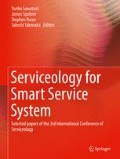Abstract
A dynamic and well-structured service system is needed for solving the food safety and food security problems in Bangladesh. Moreover, food adulteration has maximized the severity of these problems. Agricultural products are mostly adulterated, and there is a significant scarcity of these products in urban markets. Women farmers in the agricultural sector can deliver better services to consumers if opportunities can be created for them within the specialized service system. This paper proposes an innovative service model based on urban schools. The major focus of this service system is not only creation of opportunities for women farmers to become empowered but also to reduce food safety and adulteration issues and provide nutritional benefit to children in urban areas of Bangladesh.
Access this chapter
Tax calculation will be finalised at checkout
Purchases are for personal use only
References
Muniruzzaman, ANM. 2013, Food Security in Bangladesh: A Comprehensive Analysis, Peace and Security Review, 5: 46–73.
FAO (2003): Rural Women: Key to Food Security, Gender and Population Division. FAO, Rome.
Hossain, M. and Bayes, A., 2009, Rural Economy and Livelihoods: Insights from Bangladesh. A. H. Developing Publishing House, Dhaka, Bangladesh.
Abdullah, T. A. and Zeidenstein, S. 1982, Village Women in Bangladesh: Prospects for Change. A study prepared for the International Labor Office within the framework of the World Employment Program. Oxford Press.
Hossain, Mahabub and Jaim, W. M. H., 2011, Empowering Women to Become Farmer Entrepreneur: Case Study of a NGO Supported Program in Bangladesh. Paper presented in Conference on New Directions for Smallholder Agriculture, IFAD Head Quarter, Rome, 24–25 January
Birner, R., A. Quisumbing, and N. Ahmed., 2010, Governance and gender: Cross-cutting issues. Paper prepared for the Bangladesh Food Security Investment Forum, May 26–27, 2010.
Jaim, W.M.H., Hossain, M., 2011, Women’s Participation in Agriculture in Bangladesh, Paper presented in the pre-conference event on “Dynamics of Rural Livelihoods and Poverty in South Asia”, 7th Asian Society of Agricultural Economists (ASAE) International Conference Hanoi, Vietnam, 12 October.
Quisumbing, A.R., Brown, L.R., Feldstein, H.S., Haddad, L., Pena, C., 1995, Women : The key to Food Security, Food Policy Report, The International Food Policy Research Institute, Washington D.C.
IFAD, 2009, Bangladesh: Providing better Opportunities for Women’ in Making a Difference in Asia and the Pacific. Special issue: November 2009.
FAO, 2014, Towards Sustainable Agriculture and Improved Food Security and Nutrition, Bangladesh Country Programming Framework, CPF 2014–2018.
ActionAid, 2011, Investing in Women Smallholder Farmers, An ActionAid International Briefing, June 2011.
Kar, K. and Datta, D. 1998. Understanding market mobility: perceptions of smallholder farmers in Bangladesh. PLA Notes 33: 54–58. International Institute for Environment and Development, London.
Khan, F., 2013, Life-Changing Stories of Successful Women Farmers, Cereal Systems Initiative for South Asia in Bangladesh (CSISA-BD), USAID.
IFAD, 2014, Microfinance for Marginal and Small Farmers Project, Project Performance Assessment, Document of the International Fund for Agricultural Development, Report No. 3307-BD
World Bank, 2009, Gender in Agriculture Sourcebook, Agriculture and Rural Development.
Author information
Authors and Affiliations
Corresponding author
Editor information
Editors and Affiliations
Rights and permissions
Copyright information
© 2017 Springer Japan
About this paper
Cite this paper
Haque, I.T., Kohda, Y. (2017). Service Innovation for Reducing Food Adulteration Problem in Bangladesh. In: Sawatani, Y., Spohrer, J., Kwan, S., Takenaka, T. (eds) Serviceology for Smart Service System. ICServ 2015. Springer, Tokyo. https://doi.org/10.1007/978-4-431-56074-6_10
Download citation
DOI: https://doi.org/10.1007/978-4-431-56074-6_10
Publisher Name: Springer, Tokyo
Print ISBN: 978-4-431-56072-2
Online ISBN: 978-4-431-56074-6
eBook Packages: EngineeringEngineering (R0)

